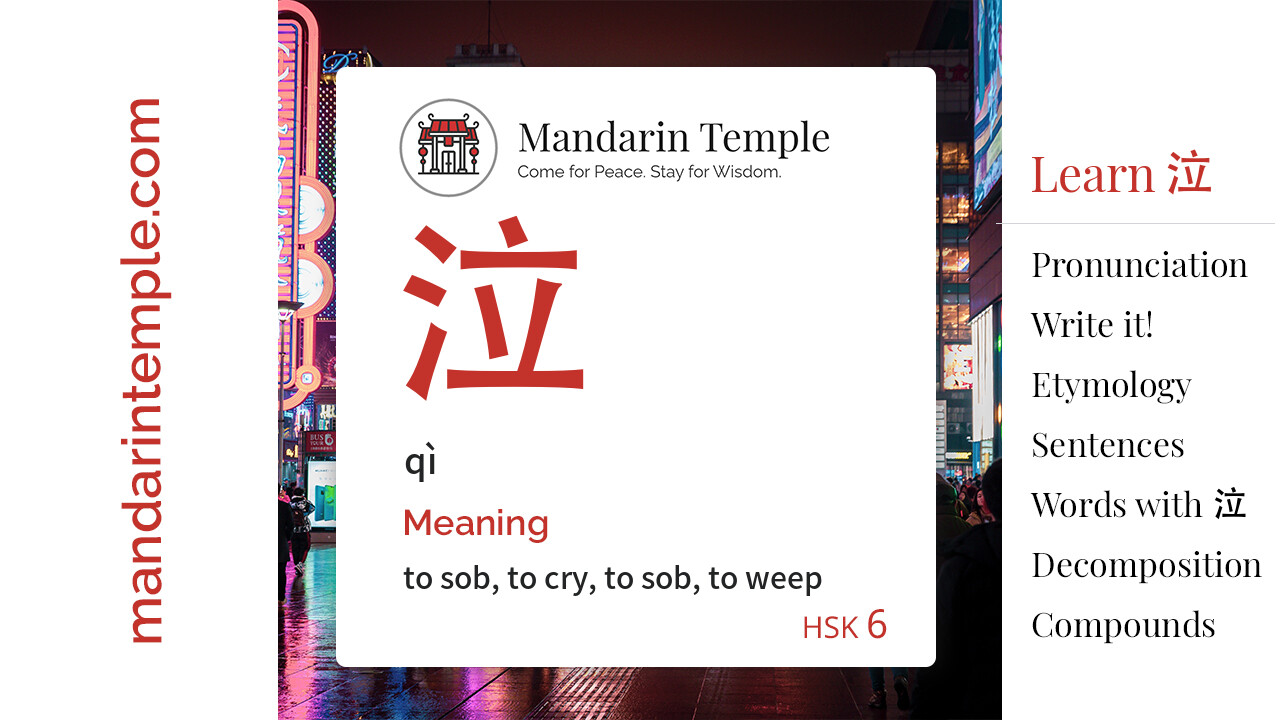Write it!
Practice your Chinese writing skills and learn precisely where and when to draw every stroke of the
Chinese word 泣 qì .
Press the Show Strokes button to see the strokes and their order and hit Start Drawing when you are
ready to practice.
To complete this step you need to write the word once.
Spread the word
“Do the difficult things while they are easy and do the great things while they are small. A journey of a thousand miles must begin with a single step.”
Lao Tzu Tweet
Example sentences using 泣 qì
Broaden your vocabulary by interacting with 5 audio-assisted sentences using the Chinese word 泣 qì in different contexts.
To complete this step you need to listen to each of the five Chinese sentences at least once. and scroll down.
“ 唉 āi , " 嘉 Jiā 莉 lì 啜泣 chuò qì 着 zhāo . " 唉 āi , 唉 āi -- 呜 wū -- 呜 wū . ”
" Oh,'sobbed Carrie, " oh, oh -- oo -- o! "
珍妮停止 tíng zhǐ 了 le 哭泣 kūqì ,吸 xī 了吸鼻子 bízi ,擦 cā 干 gān 了 le 眼泪 yǎn lèi .
When Jenney had stopped crying she sniffed and dried her eyes.
Words with 泣 qì
Explore 11 words and sayings that include the Chinese character 泣 qì in their composition.
To complete this step you need to read and scroll down.
| Frequency | Simplified | Meaning | Traditional |
|---|---|---|---|
| 哭泣 kūqì | to weep | 哭泣 kūqì | |
| 泣 qì | to sob | 泣 qì | |
| 抽泣 chōu qì | to sob spasmodically | 抽泣 chōu qì | |
| 啜泣 chuò qì | to sob | 啜泣 chuò qì | |
| 可歌可泣 kě gē kě qì | happy and sad | 可歌可泣 kě gē kě qì | |
| 悲泣 bēi qì | to weep with grief | 悲泣 bēi qì | |
| 如泣如诉 rú qì rú sù | fig. mournful (music or singing) | 如泣如訴 | |
| 涕泣 tì qì | to weep | 涕泣 tì qì | |
| 哀泣 aī qì | to wail | 哀泣 aī qì | |
| 垂泣 chuí qì | to shed tears | 垂泣 chuí qì | |
| 牛衣对泣 niú yī duì qì | couple living in destitute misery (idiom) | 牛衣對泣 |
AMAZON BOOKSHELF
AMAZON BOOKSHELF
